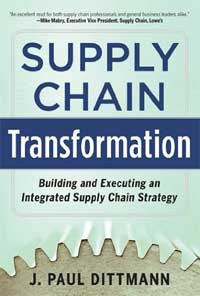|
Supply chain strategy - sounds like a good thing, doesn't it?
But what really defines a supply chain strategy? Does your company have one? Does it need one?
In 10 years, I've written about almost every subject possible, but I do not believe ever about supply chain strategy. I've come close to doing so a couple of times, but something else always got in t
he way. The reality is the subject has not been written about much by anybody in the supply chain at a detailed level.
I was reminded of my omission when I saw presentation at the Material Handling and Logistics conference in early September by Dr. Paul Dittmann, a former supply chain industry executive (Whirlpool) who now leads the Global Supply Chain Forum at the University of Tennessee.
Gilmore Says: |
 A supply chain strategy involves adding a new rudder, with a captain and a crew that know exactly how to get to their destination, but with a plan that has some resiliency built-in for the inevitable storms the ship will encounter along the way. A supply chain strategy involves adding a new rudder, with a captain and a crew that know exactly how to get to their destination, but with a plan that has some resiliency built-in for the inevitable storms the ship will encounter along the way.

Click Here to See
Reader Feedback |
It was based on his new book "Supply Chain Transformation," importantly sub-titled"Building and Executing an Integrated Supply Chain Strategy."
He said there that not long ago, he asked members of the Forum - mostly large, well-known firms - if their companies had supply chain strategies. To Dittmann, a supply chain strategy is defined as a formal written plan that details what actions the organization is going to take over a multi-year horizon.
Among Forum members, something like 18% had such a strategy. That seemed surprisingly low, Dittmann thought, so they conducted a survey among a larger group of companies. In that research, only about 15% of companies had a formal supply chain strategy.
That may seem low to some but not to me. I wonder how many of the "strategies" among the companies claiming to have one would really pass muster upon a review.
I have rarely seen a company with multi-year supply chain strategy, with one major exception. That is for companies that have embarked on a major supply chain transformation, especially if that transformation involves significant changes to the physical network. In recent years, that would include companies such as Home Depot, Hershey Foods, Kimberly-Clark, and many more.
In those situations, which generally involve big capital expenditures and expenses for closing facilities, promises to Wall Street about cost reduction expectations when the transformation is complete, etc., then of course a written, multi-year strategy is needed.
But is that really a strategy - or more like a project plan? A little of both.
So, if you are not preparing for such a major transformation, do you need a supply chain strategy? That is really the question.
A lot of things get confused as being strategies when they are something else - a goals and objective document, for example. Goals and objectives likely are a necessary part of a strategy, but they are not a strategy by themselves.
 I met an executive of a then fast growing women's apparel chain in about 2007, where he related to me what I think is a not unusual scenario: the chain had been growing so fast for many years, its stock price soaring over that period as well, that the job of the supply chain was really just to support that growth. Cost were important, but not as important as ensuring goods were on the shelf, and that new stores opened on schedule at a breakneck pace. I met an executive of a then fast growing women's apparel chain in about 2007, where he related to me what I think is a not unusual scenario: the chain had been growing so fast for many years, its stock price soaring over that period as well, that the job of the supply chain was really just to support that growth. Cost were important, but not as important as ensuring goods were on the shelf, and that new stores opened on schedule at a breakneck pace.
Now, however, growth was inevitably slowing - what was the supply chain's mission now, and how should it get there?
"We need a supply chain strategy," he said. Could I provide any help? I offered a few thoughts then and there, and we later exchanged a couple of emails, but I never really heard how that exercise turned out.
Well, I wish I had Dittmann's new book to recommend then, because it provides a prescriptive model relative to how to build a supply chain strategy a company like that apparel retailer could easily follow.
And like most things in business, that strategy should start with the customer, Dittmann says. A supply chain strategy - by definition a forward-looking document - should anticipate changing customer needs and define how the supply chain is going to evolve to meet those new requirements.
That is in fact an exercise that Walgreens has recently gone through under the relatively new supply chain leadership of Reuben Slone, who worked with Dittmann at Whirlpool and has co-written books and articles with him.
A forward-looking view of Walgreens' customer needs identified 11 new supply chain capabilities that would be required over the next few years. That in turn resulted in 25 separate projects to upgrade Walgreens' supply chain to achieve those capabilities. (Interestingly, at last Spring's WERC conference, Kathleen Shafer, director of supply chain transformation at Walgreens' rival CVS, gave an interesting presentation on how it was using a very similar process to upgrade its supply chain. Not sure if that is pure coincidence or not.)
So, back to the question of whether we all need a documented supply chain strategy: Do Finance, Marketing, HR, etc. all have such strategies? I don't think so. IT often does, however, because technology changes and initiatives often play out over several years, with big CapEx dollars involved and major decisions about direction that need to be formalized.
But I think supply chain is different than most other functions. First, in physical product companies, supply chain often accounts for 60-80% of total costs, a huge number that therefore may be deserving of more detailed, multi-year planning.
Second, supply chain generally operates as a services organization for the rest of the company. A strategy document can help the company's functions and executives to buy-into and thus support those supply chain strategies. An easy example would be plans to roll-out robust S&OP capabilities across the globe over a multi-year span.
With those two thoughts, it also seems to me that if a company as a whole has a formal, multi-year strategy document, then it makes perfect sense the supply chain have one that mirrors the corporate plan. The strategic document can be the key tool that helps keep the supply aligned with the business.
In his book, Dittmann lays out a nine-step plan for building a supply chain strategy.
1. Start with customers' current and future needs (as discussed above)
2. Assess current supply chain capabilities relative to best in class
3. Evaluate supply chain "game changers" (what megatrends will impact customers and the supply chain?)
4. Analyze the competition (something too few do for sure)
5. Survey technology - what is new or coming out there?
6. Deal with supply chain risk - risk management needs to be part of the strategy document
7. Develop new supply chain capability requirements and create a plan to get there
8. Evaluate current supply chain organizational structure, people, and metrics
9. Develop a business case and get buy-in
Obviously, there is a lot more to it than just knowing those nine steps, and the book takes the reader through each of these steps in detail a chapter at a time.
I was remiss for not tackling the strategy question for so long, and there is a lot more to say, so look for a part 2 on this soon - maybe with some of your comments.
"I often see companies without a supply chain strategy chasing the latest hot trend or flavor of the month, Dittmann writes early on in the book. "Like a ship without a rudder, it sees any wind as favorable."
A supply chain strategy involves adding a new rudder, with a captain and a crew that know exactly how to get to their destination, but with a plan that has some resiliency built-in for the inevitable storms the ship will encounter along the way.
This is a certainly topic worth more exploration, both here and across the industry.
Do too few companies have true supply chain strategies? Why? Does your company have one? Let us know your thoughts at the Feedback section
below.
|